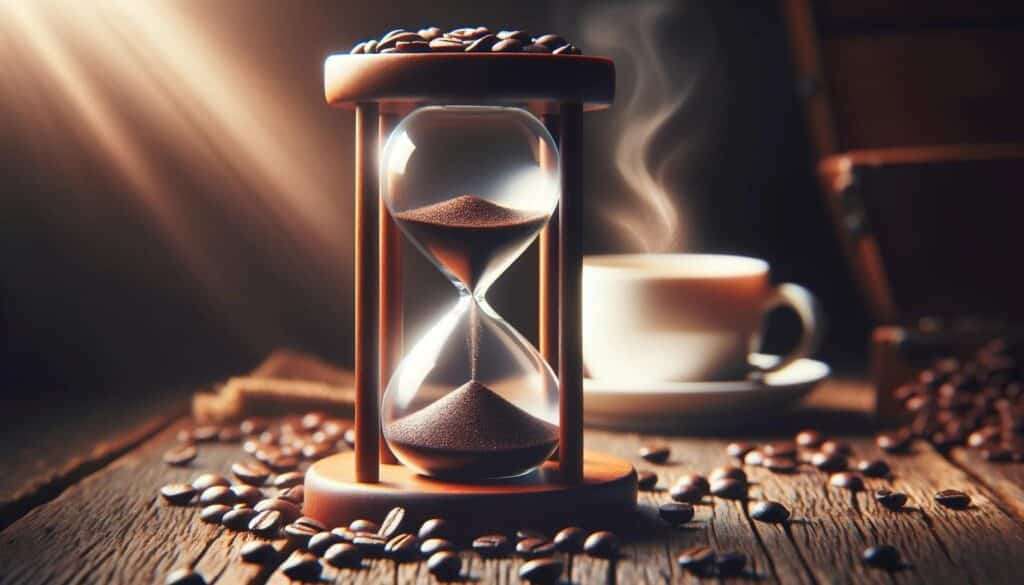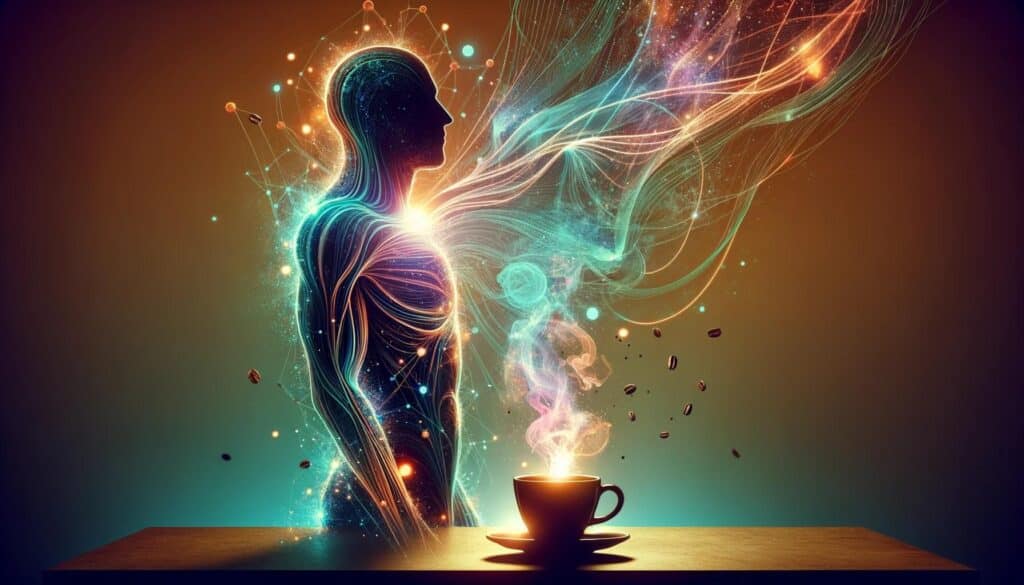Caffeine, a natural stimulant found mostly in tea, coffee, and cacao plants, helps people stay alert and prevents them from feeling tired by stimulating their brain and central nervous system. For thousands of years, people have enjoyed the benefits of caffeine, drinking coffee and tea not just for their taste but also for the energy and focus boost these drinks offer. Now, caffeine stands as the most popular psychoactive substance in the world.
Everyday life is full of caffeine, from your morning coffee to energy drinks and some medicines, showing how important it is to our society. It’s not only about getting a quick wake-up call. Moderate caffeine intake has been linked to several health advantages, such as better memory, less tiredness, and lower risks of heart disease and some cancers. However, how caffeine affects someone can change a lot based on their genetics, how much they can tolerate, and their health status.
Knowing how long caffeine’s effects last and how long it stays strong in your coffee is key to managing its influence on your health and happiness. Drinking too much caffeine can cause unwanted side effects like insomnia, nervousness, restlessness, and stomach upset. So, learning about how caffeine works in your body and how long its effects stick around can help you get the most out of it while avoiding the negatives, supporting both your health and your love for caffeinated drinks.
What is Caffeine?

Caffeine, a bitter, white crystalline substance and a type of methylxanthine alkaloid, is chemically similar to the adenosine and guanine found in DNA and RNA. Plants produce caffeine in their seeds, leaves, and fruits as a natural pesticide that paralyzes and kills some insects that eat the plants.
Brief History of Caffeine Use
People have enjoyed caffeine for thousands of years, drinking natural sources like tea leaves, coffee beans, and cacao seeds for their energizing effects. Coffee drinking first showed up in the 15th century at Sufi shrines in Yemen, then spread across the Arab world and into Europe. The story of tea starts even earlier in ancient China, where legends say Emperor Shennong discovered it in 2737 BC. The Olmec civilization in Mesoamerica was the first known to use cacao, the key ingredient in chocolate, a long time ago.
How Caffeine Works in the Human Body
Caffeine wakes you up mainly by stopping a sleep-promoting brain chemical called adenosine from working. When caffeine blocks adenosine, it boosts brain activity and releases other neurotransmitters like dopamine and norepinephrine. This not only makes you feel more alert and awake but can also lift your mood and energy levels for a while. By affecting the body’s adrenaline system, caffeine also raises your heart rate and blood pressure, helping you stay sharp and focused.
Sources of Caffeine
Caffeine is most commonly associated with coffee, but it is also present in tea, chocolate, some soft drinks, and energy drinks. The content can vary widely depending on the type, preparation, and serving size:
- Coffee: A typical 8-ounce (240-milliliter) cup of coffee contains 80 to 100 milligrams of caffeine, but this can vary widely based on the type of coffee bean, roasting method, and preparation.
- Tea: Caffeine content in tea can range from 15 to 70 milligrams per 8-ounce serving, with factors such as the type of tea leaf, processing, and brewing time affecting the total content.
- Chocolate and Cacao Products: Caffeine is naturally present in cacao, so all chocolate products contain caffeine in varying amounts. Dark chocolate generally contains more caffeine than milk chocolate.
- Soft Drinks and Energy Drinks: These can vary significantly in their caffeine content, from around 20-40 milligrams per 12-ounce serving for soft drinks to as much as 250 milligrams per serving for some energy drinks.
Comparatively, coffee is often the highest source of caffeine in many diets, followed by energy drinks, tea, and then chocolate. Understanding these sources and their caffeine content is crucial for managing intake and the stimulant’s effects on the body.
The Lifespan of Caffeine in Coffee

Caffeine’s chemical stability makes it relatively long-lasting in brewed coffee, meaning its potency doesn’t degrade significantly over time. However, the flavor, aroma, and quality of the coffee itself can deteriorate, affecting the overall coffee-drinking experience. The shelf life of brewed coffee is more about taste and freshness rather than the caffeine content, which remains largely unchanged even when the coffee is left out for several hours or stored in the refrigerator for a few days.
Factors Affecting Caffeine’s Potency Over Time in Coffee
While caffeine remains stable, several factors can influence the perceived potency of caffeine in coffee over time:
Roasting Process and Its Impact on Caffeine Levels
Lighter roasts actually retain slightly more caffeine than darker roasts. This is because caffeine is relatively stable during the roasting process, but longer roasting times at higher temperatures can degrade a small amount of caffeine. However, the difference is minimal and often not noticeable in terms of the stimulant effect.
Types of Coffee Beans and Their Caffeine Content
Arabica vs. Robusta: Arabica beans, which are known for their smooth and complex flavors, generally have less caffeine than Robusta beans, which are more bitter but pack more caffeine. The choice of bean not only affects flavor profiles but also caffeine content in the brewed coffee.
Brewing Method and Duration: Espresso vs. Drip Coffee vs. Cold Brew
- Espresso: Despite its intense flavor, a single shot of espresso might contain less total caffeine (approximately 63 mg) than a standard cup of drip coffee, due to serving size differences. However, espresso has a higher concentration of caffeine per ounce.
- Drip Coffee: This method typically results in a higher caffeine content overall due to the longer brewing time and larger serving sizes, averaging about 95 mg per cup.
- Cold Brew: Cold brew coffee, made by steeping coffee grounds in cold water for an extended period, often contains more caffeine than both drip coffee and espresso, depending on the coffee-to-water ratio. The slow extraction process in cold water ensures a high level of caffeine, along with a smooth, sweet flavor profile.
Storage Conditions and Their Effects on Caffeine Stability
- Temperature and Light: While caffeine is stable, excessive exposure to light and high temperatures can degrade other components of coffee, potentially affecting flavor and aroma long before the caffeine content is altered.
- Air and Moisture: Exposure to air can oxidize coffee beans and grounds, altering flavor. Moisture can also affect coffee’s freshness and may lead to mold growth in extreme cases, though caffeine itself remains stable.
While the caffeine in coffee is stable over time and under various storage conditions, factors like bean type, roasting process, and brewing method can influence the caffeine content in the final cup. Understanding these factors can help coffee enthusiasts tailor their brewing processes to achieve their desired caffeine intake and flavor profile.
How Long Does Caffeine Affect the Body?

Caffeine’s impact on the body is immediate and can last for several hours, with its effects being most noticeable within the first few hours after consumption. The duration and intensity of these effects vary widely among individuals due to several factors.
Absorption and Metabolism of Caffeine
Caffeine is rapidly absorbed from the digestive tract, with peak plasma concentrations occurring about 15 to 45 minutes after ingestion. Its solubility in water and fat allows it to easily cross the blood-brain barrier, exerting its stimulating effects by blocking adenosine receptors.
Peak Levels and Half-Life of Caffeine in the Bloodstream
The half-life of caffeine—the time it takes for the body to eliminate half of the caffeine consumed—varies significantly among individuals, averaging 3 to 5 hours. This means that caffeine can continue to affect the body for several hours after it is consumed, depending on how quickly an individual metabolizes it.
Variables That Influence How Long Caffeine’s Effects Last in the Body
- Metabolic Rate: Individuals with a faster metabolic rate will break down caffeine more quickly, reducing its duration of action.
- Liver Function: The liver plays a crucial role in metabolizing caffeine. Variations in liver health and function can affect how long caffeine stays in the system.
- Pregnancy: Pregnant women often metabolize caffeine more slowly, especially in the third trimester, extending its effects.
- Smoking: Smokers may metabolize caffeine twice as fast as non-smokers, shortening its active duration.
Individual Differences in Caffeine Sensitivity
The response to caffeine can vary dramatically among individuals due to several factors:
Genetic Factors and Caffeine Metabolism
Genetics: Genetic differences in the enzymes responsible for metabolizing caffeine can lead to faster or slower caffeine clearance from the body. This genetic variability significantly affects both sensitivity to caffeine and the duration of its effects.
Age, Body Weight, and Individual Tolerance Levels
- Age: Older adults may metabolize caffeine more slowly, leading to a prolonged effect.
- Body Weight: Generally, individuals with higher body weight may require more caffeine to feel its effects, although this is not a strict rule.
- Tolerance: Regular caffeine consumption leads to tolerance, requiring higher doses to achieve the same effects. Conversely, infrequent users might find themselves more sensitive.
Interaction with Medications and Other Substances
- Medications: Certain medications can inhibit the enzymes that metabolize caffeine, prolonging its effects. Others might accelerate its metabolism, reducing its impact.
- Other Substances: The consumption of alcohol, nicotine, and even certain foods can influence how caffeine is metabolized and its overall effects on the body.
Understanding these individual differences and variables is crucial for managing caffeine intake and optimizing its benefits while minimizing negative effects. This knowledge can help individuals tailor their caffeine consumption to their personal health profiles and lifestyles.
Health Implications of Caffeine Consumption

Caffeine, when consumed in moderation, can offer several health benefits, but excessive intake can lead to negative side effects. Understanding both the short-term and long-term health implications is crucial for making informed decisions about caffeine consumption.
Short-term Benefits and Potential Side Effects of Caffeine
Benefits:
- Increased Alertness and Concentration: Caffeine’s most well-known effect is its ability to enhance alertness, making it a popular choice for improving concentration and combating fatigue.
- Enhanced Physical Performance: Caffeine can increase adrenaline levels and release fatty acids from fat tissues, leading to improved physical performance.
- Mood Boost: It can also boost mood in some individuals, thanks to its effects on dopamine levels.
Potential Side Effects:
- Anxiety and Nervousness: High doses of caffeine can increase anxiety and lead to jitteriness and nervousness.
- Sleep Disturbances: Consuming caffeine late in the day can interfere with sleep, reducing sleep quality and duration.
- Digestive Issues: Some people may experience digestive discomfort or acid reflux with caffeine consumption.
- Increased Heart Rate and Blood Pressure: Temporarily increased heart rate and blood pressure can be a concern for those with certain cardiovascular conditions.
Long-term Effects of Regular Caffeine Consumption on Health
Positive Effects:
- Reduced Risk of Certain Diseases: Studies have linked moderate caffeine consumption with a reduced risk of Parkinson’s disease, Alzheimer’s disease, and certain types of cancer.
- Antioxidant Properties: Caffeine contains antioxidants, which can help fight free radicals and reduce inflammation.
Negative Effects:
- Dependence: Regular, heavy caffeine use can lead to dependence, making it difficult to reduce intake without experiencing withdrawal symptoms such as headaches, fatigue, and irritability.
- Potential Increase in Heart Disease Risk: Some studies suggest that very high caffeine intake might be linked to an increased risk of heart disease in individuals with a specific genetic mutation affecting caffeine metabolism.
Recommendations for Safe Caffeine Intake
- General Guidelines: Most health authorities recommend limiting caffeine intake to 400 milligrams per day for most adults, roughly the amount in four 8-ounce cups of brewed coffee.
- Pregnant and Breastfeeding Women: It is advised to limit caffeine intake to less than 200 milligrams per day due to potential effects on fetal development and sleep patterns of the baby.
- Individual Sensitivity: Those with anxiety disorders, sleep disturbances, or certain heart conditions should consider lower limits or avoiding caffeine altogether.
- Monitoring Intake: Be aware of all sources of caffeine in your diet, including energy drinks, tea, soda, and chocolate, to avoid unintentional excessive intake.
Adhering to these recommendations and being mindful of your own body’s reactions to caffeine can help you enjoy its benefits while minimizing the risk of adverse effects. Regularly assessing your caffeine habits in the context of your overall health and lifestyle can ensure that your consumption remains within a safe and beneficial range.
Tips for Managing Caffeine Intake from Coffee

Navigating the world of coffee and caffeine can be both enjoyable and overwhelming. Whether you’re looking to optimize your caffeine boost, manage sensitivity, or simply enjoy your brew without unwanted side effects, these tips can help guide your coffee choices and habits.
Choosing the Right Type of Coffee for Your Caffeine Needs
- Understand Bean Types: Arabica beans generally have less caffeine compared to Robusta beans. If you’re looking to lower your caffeine intake, opt for Arabica-based coffees.
- Consider the Roast: Contrary to popular belief, light roasts have slightly more caffeine than dark roasts when measured by scoops. However, because dark roasts are less dense, if you’re measuring by weight, the difference is minimal.
- Pay Attention to the Brew Method: Espresso has more caffeine per ounce, but due to serving size, a standard cup of drip coffee usually contains more total caffeine. Adjust your brewing method according to your caffeine preference.
Understanding Your Personal Caffeine Sensitivity and Adjusting Consumption Accordingly
- Monitor Your Response: Keep track of how different amounts of coffee affect your energy, mood, sleep, and any side effects. This can help you find your ideal caffeine threshold.
- Adjust Gradually: If you need to change your caffeine intake, do it gradually to avoid withdrawal symptoms like headaches and irritability.
- Consider Timing: If caffeine affects your sleep, try to limit coffee consumption to the morning hours or at least 6 to 8 hours before bedtime.
Strategies for Reducing Caffeine Intake Without Sacrificing Enjoyment of Coffee
- Mix It Up with Decaf: Consider blending decaffeinated coffee with regular coffee to lower the overall caffeine content while still enjoying the taste of coffee.
- Experiment with Coffee Alternatives: Chicory coffee and herbal teas can offer a coffee-like experience without the caffeine. There are also numerous caffeine-free herbal teas with rich flavors to explore.
- Savor the Flavor: Focus on the sensory aspects of coffee drinking, such as the aroma, warmth, and taste. Experimenting with different brewing methods, origins, and roasts can enhance your appreciation of coffee beyond just the caffeine content.
- Stay Hydrated: Sometimes, what feels like a need for caffeine is actually dehydration. Ensure you’re drinking plenty of water throughout the day.
- Moderate Your Sips: If you’re used to having multiple cups, try reducing the size of each cup or slowly decrease the number of cups per day. This approach can help you lower your caffeine intake without feeling deprived.
By understanding your personal needs and preferences, you can enjoy coffee in a way that suits your lifestyle and health goals. Whether you’re a casual drinker or a coffee aficionado, a mindful approach to caffeine can enhance both your enjoyment and the benefits you derive from your coffee ritual.
Conclusion
As we explore how caffeine moves from the coffee bean to its lasting effects on our bodies, it’s clear that this powerful compound significantly affects our daily lives. Learning about how long caffeine lasts in coffee and what affects its strength and effects gives us valuable tips on how to enjoy our favorite drink while avoiding any downsides.
The way caffeine stays in our coffee, from when we brew it to when we slowly drink it, shows why we should think carefully about how much coffee we drink. By knowing what changes the caffeine level—from the bean type and roast to how we make our coffee—coffee lovers can adjust how they make and drink their coffee to fit their own needs and likes.
Moreover, seeing how differently caffeine can affect people, based on their genes, lifestyle, and how sensitive they are to caffeine, points out why we need a personal approach to drinking coffee. It’s not just about how much coffee we drink, but understanding how our bodies react to caffeine that helps us find the right amount to drink.
In closing, let’s celebrate the deep culture and tradition of drinking coffee with a fresh view on caffeine. Drinking coffee responsibly means knowing about its impact on our health and happiness, helping us make choices that let us enjoy our coffee without harming our health. Whether you’re enjoying a morning cup to start your day or a comforting brew to relax, let your understanding of caffeine lead you to a balanced and delightful coffee experience.
Frequently Asked Questions
- How does the type of coffee bean affect caffeine content?
- Arabica beans typically contain less caffeine than Robusta beans. The choice between Arabica and Robusta can influence the caffeine level in your coffee, with Robusta offering a stronger caffeine kick.
- Can the caffeine in my coffee degrade over time if I leave it out?
- No, caffeine is quite stable and does not degrade significantly over time in brewed coffee. The taste and aroma of the coffee may change, but the caffeine content remains relatively constant.
- How quickly does caffeine start to affect the body after drinking coffee?
- Caffeine begins to affect the body quickly, with peak blood levels reached within 15 to 45 minutes after consumption. The immediate effects, like increased alertness, can be felt soon after drinking.
- Is it possible to reduce caffeine intake without giving up coffee entirely?
- Yes, you can reduce caffeine intake by mixing regular coffee with decaffeinated coffee, choosing lighter roasts, or adjusting the brewing method to extract less caffeine.
- Does the way I brew my coffee affect its caffeine content?
- Absolutely. Brewing methods like espresso produce a concentrated coffee with more caffeine per ounce, whereas methods like drip or French press offer a different caffeine profile due to varying water contact times and temperatures.






